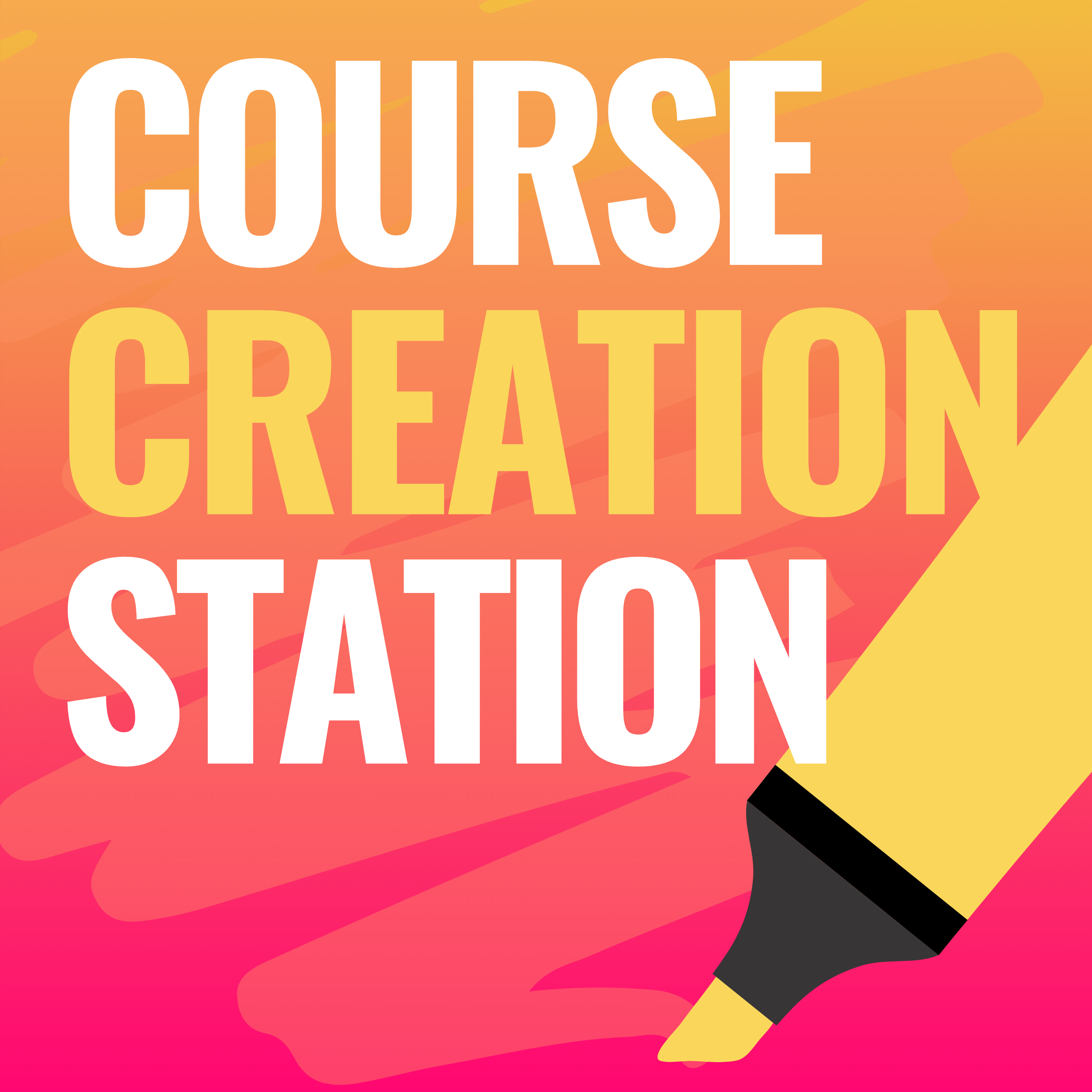Episode 10
7 Regrets You May Have as a Course Creator
Hey, Course Creator!
You've reached the show notes for this episode. But before you get started, did you grab your FREE course creation starter guide yet? Be sure to grab it at the link below and learn my 7-step course creation process:
>> Create Your AWESOME Course Starter Guide <<
About this episode:
In today’s episode, we'll talk about the regrets that I see as a course creator - so that you will know the appropriate action to take when you create your course and can avoid the regrets and you won’t be left thinking “ugh! I should have known that!”
Goals:
After listening to this episode, you will know:
- Seven regrets you might face as a course creator
- How decisions you make in your course can affect your students motivation
- How to prevent having regrets as you plan and create your course
Stay in touch:
- Let's work together! Visit me at https://gwentanner.com and get in Contact so that we can work together on your amazing project.
- Get the FREE Create Your AWESOME Course Starter Guide! Learn my 7-step course creation process for planning and creating your awesome course.
Transcript:
Please note: This transcript may be automatically generated and may contain errors. I appreciate your understanding.
Transcript
Hey, course creators. It's time to amplify your genius. Welcome to course creation station, where we talk about creatively sharing your expertise and designing the most awesome learning experiences. I'm Gwen Tanner, career course creator.
Have you ever forgotten to change the battery in your flashlight? Always thinking that you'll get to it one day, but then there it is, a power outage, and all you have is that flashlight with the dead battery. And as you're sitting holding that useless flashlight in the dark, you're thinking, why didn't I just change the battery when I thought about it?Well, that's called regret, and I want to help you avoid course creator’s regret, so stay tuned.
We all regret things. It can be regret from not sharing more moments with a loved one or maybe procrastinating buying the week's groceries. And when we get there on the weekend, the store is crowded and the lines are long or even not going back out to roll up the car windows even though you knew that a storm was on its way to your town. After we made the decision to not do something, we often realized one of two things. It was a situation that could have been avoided if we had just taken the appropriate action or we didn't know what action we should have taken to avoid the situation. And then we think, ugh, I should have known that.
Sometimes we can go back and make things better. Other times, we just have to live with our mistake. In today's episode, I want to share with you seven regrets that I see as a course creator, so that you will know the appropriate action to take when you create your course and can avoid the regrets and you won't be left thinking, uh, I should have known that. Let's get started.
All right. Regret number one, lack of clear learning objectives. This means failing to define specific, measurable learning objectives for your course, which can result in a lack of focus and direction for both you as the course creator and also for your students.
You'll regret it, because without clear learning objectives, your students may struggle to understand what they're supposed to achieve from your course. This can lead them to being confused and disengaged, and they won't reach the transformation you promised them.
To avoid having this regret, be sure to, clearly define specific learning objectives for each of your modules or lessons, outlining exactly what your students will know or be able to do after they complete your course.
Regret number two, overwhelming content. This means including an excessive amount of information or just trying to cover way too many topics in your course. Doing this can overwhelm your students and make it challenging for them to absorb and retain what you're teaching.
You'll regret it because overloading students with too much information or complex content can lead to brain overload, making it difficult for them to remember the content you're teaching, or they will just get stuck and never be able to progress.
To avoid having this regret, you'll want to break down your course content into manageable chunks, and it's called chunking, and make sure that you prioritize the most important information and you also want to use interactivity to help break up monotonous lessons like long videos or long readings that you may include in your course, and this will help to give their brains a break.
Regret number three poor course structure. This means neglecting to organize your content in a logical way, making it difficult for your students to follow the progression of your course and understand the material effectively. I see this so often, and it's usually because of the overwhelming content which we just discussed, and the course creator just doesn't know how to organize it to be the most effective because there's just so much of it.
You'll regret this because having a disorganized or confusing course structure can hinder your students ability to navigate the course and follow a logical path through your content. The result is that they will feel frustration and it might take them much longer to complete your course.
To avoid having this regret, be sure to develop a clear and logical structure for your course, organizing your main content into modules or sections with consistent formatting and labeling to guide your students through the learning experience.
The fourth regret is neglecting interactivity in your course. This means not incorporating interactive elements such as quizzes, discussions, or activities, which can lead to a passive learning experience, reducing your students engagement.
You'll regret it because when you fail to incorporate interactivity, it makes the course feel passive and uninspiring, leading to decreased engagement and motivation to get through all the content. Think about those long lectures from some of your least favorite classes in school. You couldn't wish for it to be over, right?
To avoid having this regret, be sure to integrate interactivity throughout your course to help encourage your students participation and collaboration and discussion, or even physical movement. This will help make your course feel more engaging and dynamic.
Regret number five is not doing your initial research and ignoring your target students. This means failing to understand the needs, knowledge level, and learning preferences of your students, and it can result in you creating content that's either too basic or too advanced for them.
You'll regret it because creating a course without considering your students specific needs, preferences, and skill levels, you can end up creating course content that misses the mark and fails to resonate with what their expectations are from your course.
To avoid having this regret, always conduct thorough research to understand the demographics, motivations, and learning styles of your potential students before you start creating your course. Then you'll be able to tailor your course content and delivery methods to their unique requirements and interests.
Regret number six, not giving adequate feedback. This means not providing timely and meaningful feedback on assignments or activities that you ask them to do, which can hinder your students progress and motivation.
This is a regret because when you neglect to provide meaningful and timely feedback on the things you ask your students to do, it really deprives them of opportunities for self assessment and improvement, which can slow down their learning progress. If you recall the amazing student story, which is episode three, that feedback is built into their learning journey. Those two stages that work together, exploration and integration. Integration is where you provide feedback and your students begin to master what you're teaching them.
To avoid having this regret, you'll want to use a variety of methods or opportunities for feedback, such as quizzes or assignments and collaboration with other students and constructive feedback to help them gauge their understanding and help them figure out what they know and don't know well yet.
And finally, regret number seven, poor communication and support. What I mean by this is neglecting to establish clear lines of communication and provide adequate support to your students. And this could be through discussion threads on a Facebook group or Q A sessions on Zoom. When you don't have this built in support, it can leave students feeling disconnected and unsupported.
This is a regret because if your students feel there is insufficient communication with you or there is a lack of support resources, they can begin to feel isolated and frustrated when they encounter challenges or they have questions which can lead to decreased satisfaction with your course and that can affect your course completion rates.
To avoid having this regret, be sure that you establish clear channels of communication, such as discussion forums like on Facebook, email support, and office hours. And in addition, be sure to provide prompt and helpful responses to your students' questions and concerns to make sure that they feel supported throughout the course.
So there we have it, seven potential regrets you might have as a course creator. Have you felt any of these regrets yet? I know I have, especially in some cases when I had no choice but to avoid adding any interactivity by the request of the person I was creating the course for. And these poor students had to watch hours of videos just staring at the screen, no way to interact with the content or test what they know or learn from the videos.
Well, if you've had any regrets as a course creator, I want to hear them. Just send them my way and let me know why you felt it was a regret. I'd love to hear more about that.
If you have any questions, or if you want to learn more about what it takes to be a course creator, be sure to reach out. And thank you for joining me today for this episode of course Creation Station. Be sure to visit coursecreationstation.com to view today's show notes and subscribe.


